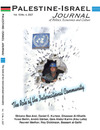Koly was always there when you needed him. To take you, in his Honda, to Ramallah, to see a Palestinian leader - before he left for Jordan, or before he was arrested by Israel's security services. To listen to the complaints of Jewish settlers, accusing the Israeli government of "sabotaging" Israel's national interests, by stopping the savage, illegal installation of mobile homes on land taken from Palestinians while Israel's Supreme Court was still examining the Palestinians' complaint.
To visit a Palestinian village that had lost a greater part of its arable land due to the illegal settlement of Jewish religious fanatics. One needed a special permit, from the military administration, in order to enter the Occupied Territories. A permit not in our possession. Koly knew that in participating in this venture, he was breaking the law. He merely shrugged when I mentioned this to him.
Not that he was eager to defy Israel's military authorities. Far from that, Koly did not belong to those starry-eyed anti-Israeli protesters, in the eyes of whom the Palestinians can do no wrong, while Israel is accused of all the seven sins mentioned in the Holy Scriptures.
A successful businessman and a moderate by temperament, Koly was not merely a pragmatist. His approach was also a moral one. He did not hesitate to put on the agenda, again and again, the same question, if he judged it vital for the country's good, for Israeli's moral stature, for the justice and peace all are entitled to. He knew that the continued military occupation of the West Bank (reinforcing the mutual distrust and the armed conflict between Israelis and Palestinians) endangered the two peoples' future. He knew that what was needed was to withdraw to mutually agreed borders, that in due time could and would become a peace frontier between Israel and Palestine.
He opted for peace. He opted for life.
Victor Cygielman
Tel Aviv, January 21, 2007

